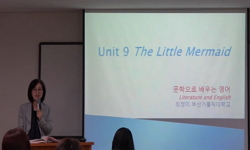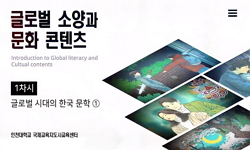This study explores theories of content literacy and disciplinary literacy in search of implications for reading content development, building on the reading competency concept and assessment framework of the Programme for International Student Assess...
http://chineseinput.net/에서 pinyin(병음)방식으로 중국어를 변환할 수 있습니다.
변환된 중국어를 복사하여 사용하시면 됩니다.
- 中文 을 입력하시려면 zhongwen을 입력하시고 space를누르시면됩니다.
- 北京 을 입력하시려면 beijing을 입력하시고 space를 누르시면 됩니다.

21세기 문식성 계발을 위한 내용문식성과 읽기 과제 모형 탐색 = Theoretical Exploration of Content Literacy and Reading-Task Models for 21st-Century Literacy
한글로보기부가정보
다국어 초록 (Multilingual Abstract)
A new disciplinary literacy theory asserts the need to balance content and literacy, going so far as to suggest unique literacy skills for subject content. PISA trends and advanced literacy instruction in disciplinary literacy theory, underlying readers’ roles and goals and authentic reading tasks, suggest models for content-area reading and content literacy instruction. In Korea, the psychological approach to reading competency, which still adheres to the 2015 curriculum and textbooks, should be converted to a social constructivist perspective and text-based reading tasks with multiple documents. To do so requires empirical studies for reading task development based on collaboration between disciplinary specialists and literacy experts.
This study explores theories of content literacy and disciplinary literacy in search of implications for reading content development, building on the reading competency concept and assessment framework of the Programme for International Student Assessment (PISA) 2018 that reflects the orientation of literacy education in the 21st century. Common Core State Standards(CCSS) emphasized literacy education, focusing on close reading, complex texts, and multiple-document reading. The effects of generic literacy skills have been widely questioned by secondary subject teachers.
A new disciplinary literacy theory asserts the need to balance content and literacy, going so far as to suggest unique literacy skills for subject content. PISA trends and advanced literacy instruction in disciplinary literacy theory, underlying readers’ roles and goals and authentic reading tasks, suggest models for content-area reading and content literacy instruction. In Korea, the psychological approach to reading competency, which still adheres to the 2015 curriculum and textbooks, should be converted to a social constructivist perspective and text-based reading tasks with multiple documents. To do so requires empirical studies for reading task development based on collaboration between disciplinary specialists and literacy experts.
참고문헌 (Reference)
1 박수자, "질문생성전략 강화 국어 수업이 초등학생 독해력과 질문에 미치는 효과" 한국초등국어교육학회 (64) : 39-63, 2018
2 박혜영, "우리나라의 PISA 2012 읽기 결과에 대한 국제 비교 분석" 한국교육과정평가원 19 (19): 101-125, 2016
3 유상희, "상황 기반 리터러시 평가를 위한 시론: 리터러시 평가에서 ‘상황’을 고려한다는 것은 어떤 의미인가?" 교과교육연구소 22 (22): 264-273, 2018
4 조병영, "미국 공통핵심기준의 가능성과 한계에 대한 비판적 고찰 —읽기 영역을 중심으로—" 국어교육학회 49 (49): 625-656, 2014
5 김종윤, "다문서 읽기 환경을 고려한 비판적 읽기 개념의 이론적 확장" 한국어교육학회 (157) : 223-258, 2017
6 김종윤, "다문서 읽기 연구의 연구 동향과 전망" 국어교육학회 49 (49): 137-163, 2014
7 정은아, "국어교과의 대상 텍스트에 관한 고찰 ― ‘정보 텍스트 읽기를 확대하자는 주장’ 및 ‘CCSS’와 관련하여 ―" 한국어교육학회 (144) : 465-489, 2014
8 교육부, "국어과 교육과정"
9 천경록, "국어 교과서와 과학 교과서 간의 통합성 분석" 청람어문교육학회 (67) : 157-184, 2018
10 김주환, "국가 수준 평가・조사의 ‘읽기’ 영역 결과에 대한 재고찰" 한국 리터러시 학회 9 (9): 189-223, 2018
1 박수자, "질문생성전략 강화 국어 수업이 초등학생 독해력과 질문에 미치는 효과" 한국초등국어교육학회 (64) : 39-63, 2018
2 박혜영, "우리나라의 PISA 2012 읽기 결과에 대한 국제 비교 분석" 한국교육과정평가원 19 (19): 101-125, 2016
3 유상희, "상황 기반 리터러시 평가를 위한 시론: 리터러시 평가에서 ‘상황’을 고려한다는 것은 어떤 의미인가?" 교과교육연구소 22 (22): 264-273, 2018
4 조병영, "미국 공통핵심기준의 가능성과 한계에 대한 비판적 고찰 —읽기 영역을 중심으로—" 국어교육학회 49 (49): 625-656, 2014
5 김종윤, "다문서 읽기 환경을 고려한 비판적 읽기 개념의 이론적 확장" 한국어교육학회 (157) : 223-258, 2017
6 김종윤, "다문서 읽기 연구의 연구 동향과 전망" 국어교육학회 49 (49): 137-163, 2014
7 정은아, "국어교과의 대상 텍스트에 관한 고찰 ― ‘정보 텍스트 읽기를 확대하자는 주장’ 및 ‘CCSS’와 관련하여 ―" 한국어교육학회 (144) : 465-489, 2014
8 교육부, "국어과 교육과정"
9 천경록, "국어 교과서와 과학 교과서 간의 통합성 분석" 청람어문교육학회 (67) : 157-184, 2018
10 김주환, "국가 수준 평가・조사의 ‘읽기’ 영역 결과에 대한 재고찰" 한국 리터러시 학회 9 (9): 189-223, 2018
11 천경록, "교과독서에 대한 고등학교 교사들의 인식 : 문학, 역사, 과학, 수학을 중심으로" 한국독서학회 (47) : 97-124, 2018
12 박수자, "교과 독서의 본질과 과제" 한국독서학회 (14) : 35-54, 2005
13 김영란, "과학과 언어(국어)의 통합적 교수·학습을 위한 ‘讀·討·論’ 모형화 연구: 학문 문식성 개념을 기초로 하여" 한국교육과정평가원 19 (19): 149-178, 2016
14 Shanahan, T., "What Is Disciplinary Literacy and Why Does It Matter?" 32 (32): 7-18, 2012
15 Rouet, J., "The Skills of Document Use: From Text Comprehension to Web-based Learning" Routledge 2012
16 Shanahan, C., "The Implications of Disciplinary Literacy" 57 (57): 628-631, 2014
17 Cameron, C., "The Effects of Instruction on Students’ generation of Self-Questions when Reading Multiple Documents" 85 (85): 334-351, 2017
18 Mccrudden, M. T., "Text relevance and learning from text" Information Age Publishing Inc 1-17, 2011
19 Chauvin, R., "Teaching Content-Area Literacy &Disciplinary Literacy" 3 (3): 1-10, 2015
20 Krajick, J. S., "Supporting Students in Developing literacy in Science" 328 (328): 456-459, 2010
21 Mccrudden, M. T., "Relevance and Goal-Focusing in Text Processing" 19 : 113-139, 2007
22 Rouet, J., "RESOLV: Readers’ Representation of Reading Contexts and Tasks" 52 (52): 200-215, 2017
23 박혜영, "PISA 읽기 평가틀의 변화 특징 탐색" 한국어교육학회 (157) : 259-283, 2017
24 Organization of Economic and Cultural Development, "PISA 2015 draft frameworks"
25 구자옥, "OECD 국제 학업성취도 평가 연구-PISA 2015 결과 분석 및 PISA 2018 예비검사 시행 기반 구축" 한국교육과정 2017
26 송미영, "OECD 국제 학업성취도 평가 연구 - PISA 2012 결과 분석 및 PISA 2015 예비검사 시행 기반 구축" 한국교육과정 평가원 2014
27 Feebody, P., "Literacies Programs : Debates and demands in cultural context" 5 (5): 7-16, 1990
28 Oczkus, L., "Just the facts: Close reading and comprehension of information text" Shell Education 2014
29 Shockett-Qafleshi, E., "How teachers develop content literacy of their students and use children’s literature for such purpose" 4 (4): 45-58, 2011
30 Wilson, D., "Handbook of Pragmatics" Blackwell 2002
31 New York and London, "Effective content reading strategies to develop mathematical and scientific literacy: Supporting common core state standards and the next generation science standards" Rowman & Littlefield 2015
32 Zygouris-Coe, V. I., "Disciplinary Literacy and the Common Core State Standards" 32 (32): 35-50, 2012
33 Gillis, V., "Disciplinary Literacy : Adapt Not Adopt" 57 (57): 614-623, 2014
34 Goldman, S. R., "Disciplinary Literacies and Learning to Read for Understanding : A Conceptual Framework for Disciplinary Literacy" 51 (51): 219-246, 2016
35 Brozo, W. G., "Content Area Reading and Disciplinary Literacy" 56 (56): 353-357, 2013
36 Bennett, B., "Common Core in the Content Area : Balancing content and literacy" Routledge 2014
37 Strassner, "Close reading strategies and reading comprehension" 2015
38 FLORIDA DEPARTMENT of EDUCATION(fldoe.org), "Close Reading and Comprehension Strategies How do they compare? Adapted from Information Text Close Reading presentation and blogposts by Dr. Timothy Shanahan" University of Chicago
39 Shanahan, C., "Analysis of Expert Readers in Three Discipline : History, Mathematics, and Chemistry" 43 (43): 393-429, 2011
40 Stephens, E. C., "A handbook of content literacy strategies: 125Practical reading and writing ideas" Christopher-Gordon Publishers, Inc 2005
41 이순영, "21세기 국어과 교육과정 개정의 방향 탐색 -미국의 ‘공통핵심기준’의 특성과 시사점 분석을 중심으로-" 청람어문교육학회 (43) : 7-35, 2011
동일학술지(권/호) 다른 논문
-
쓰기 막힘과 멈춤에 대한 필자의 인식 양상 고찰 - 갈래와 수준을 고려한 글쓰기를 중심으로 -
- 한국어교육학회
- 서종훈
- 2019
- KCI등재
-
중학생이 쓴 글의 분량 연구 - 쓰기 과제 구성 요소로서 시간을 중심으로 -
- 한국어교육학회
- 김경환
- 2019
- KCI등재
-
멀티미디어 기반 ‘자기조절학습(self-regulated learning)’이 한국어 학습자의 어휘 학습 과정에 미치는 영향 - 중국인 중‧고급 학습자의 사례를 중심으로 -
- 한국어교육학회
- 박진희
- 2019
- KCI등재
-
- 한국어교육학회
- 이삼형
- 2019
- KCI등재
분석정보
인용정보 인용지수 설명보기
학술지 이력
| 연월일 | 이력구분 | 이력상세 | 등재구분 |
|---|---|---|---|
| 2027 | 평가예정 | 재인증평가 신청대상 (재인증) | |
| 2021-01-01 | 평가 | 등재학술지 유지 (재인증) |  |
| 2018-01-01 | 평가 | 등재학술지 유지 (등재유지) |  |
| 2015-01-01 | 평가 | 등재학술지 유지 (등재유지) |  |
| 2011-01-01 | 평가 | 등재학술지 유지 (등재유지) |  |
| 2009-01-01 | 평가 | 등재학술지 유지 (등재유지) |  |
| 2007-01-01 | 평가 | 등재학술지 유지 (등재유지) |  |
| 2006-02-24 | 학술지명변경 | 외국어명 : 미등록 -> Korean Language Education |  |
| 2005-01-01 | 평가 | 등재학술지 유지 (등재유지) |  |
| 2002-01-01 | 평가 | 등재학술지 선정 (등재후보2차) |  |
| 1999-07-01 | 평가 | 등재후보학술지 선정 (신규평가) |  |
학술지 인용정보
| 기준연도 | WOS-KCI 통합IF(2년) | KCIF(2년) | KCIF(3년) |
|---|---|---|---|
| 2016 | 1.01 | 1.01 | 0.94 |
| KCIF(4년) | KCIF(5년) | 중심성지수(3년) | 즉시성지수 |
| 0.92 | 0.96 | 1.335 | 0.5 |




 KISS
KISS






